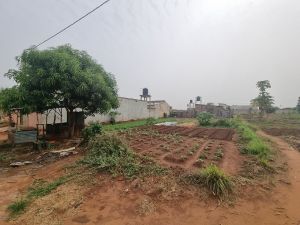Romuald Gbegan's farm
Agroecology, diversity of crops, soil fertility, compost, crop associations
Romuald Gbegan
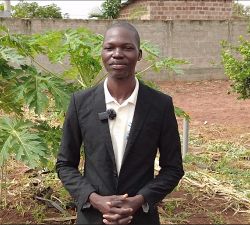
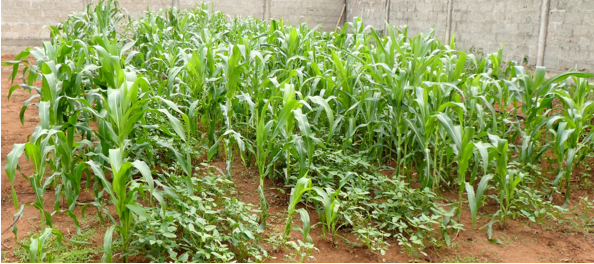
Romuald Gbegan, a farmer in Akassato, Benin, cultivates his land according to the principles of agroecology. Here is the profile of his farm.
Context
- Name: Romuald Gbegan.
- Location: Akassato, Benin.
- Farm name: Akassato.
- Installation date: 2017. His father was a farmer, and he worked with him since childhood.
- Cultivated area: 1.3 ha, with 1 ha cultivated.
- Soil texture: Ferrallitic soil on loose sediment clay-sandy.
- Number of people working on the farm: 2.
- Productions:
- Vegetable crops: Cucumber, tomato (60t/ha/year), lettuce.
- Food crops: Carrot, chili pepper, bell pepper, corn, cowpea, sorghum, lemongrass, peanut, cassava.
- Fruit trees: Papaya (500m²) 63 trees, producing 80 papayas weekly.
- Climate: From savannah to dry winter (Aw according to Köppen-Geiger classification). Akassato is an area with significant precipitation. Even during the driest month, it rains a lot. Throughout the year, the average temperature is 27.4°C, and the average precipitation is 1217.1mm.
- Education/training/life path:
- Master's degree in food technology in 2014.
- Training on entrepreneurship to be able to produce tomato paste.
- Two-part training on tomatoes by the company Holland Green Tech: Production (tomato varieties, life cycle, how to produce them) and value chain.
Motivations and objectives
According to Romuald, 90% of the ailments humans suffer from are due to poor nutrition. Farmers use a lot of chemical insecticides and pesticides. They modify the genetic material of plants. Romuald wants to do everything to contribute to the agroecological transition of local producers.
After noticing that tomatoes produced in Benin are waterlogged (making their processing and preservation difficult), Romuald decided to find and produce a variety of tomatoes with generous flesh, in order to start a tomato processing business."
Agronomic aspect
Agricultural practices
Soil fertility management
- Poultry manure: 1 bag of 50 kg = 15 plots of 6m². Purchase of 150 bags of poultry manure per year.
- Compost: 3 bags of 50 kg produced by Romuald from dead leaves, only for tomatoes.
- NPK: 1 kg of NPK.
Pest Management
The management of pests on the farm is carried out through fungicidal and insecticidal treatments applied preventively.
- Insecticides: Emacot and Gbayédo.
- Fongicide: Manga plus.
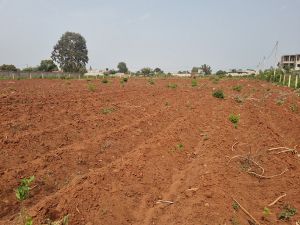
Soil Work
- Manual labor each time they sow.
- Establishment of ridges to turn over the soil, and he adds manure and cut weeds to the ridges to fertilize.
Strategies to address constraints
- Selection of 3 vegetables for production and sale in market gardening: Cucumber, tomato, lettuce to facilitate technical routes and improve yield.
- Production of maize and cassava (associated): He adds peanut this year to try to reduce nitrogen input and have more production. It's a technique experimented by an elder of the village and has yielded good results.
He started with Organic Farming, but customers do not value organic products. They consider them less "beautiful," and Romuald couldn't sell them or only at a discount. So, he started using NPK. Now he uses poultry manure, and it works well.
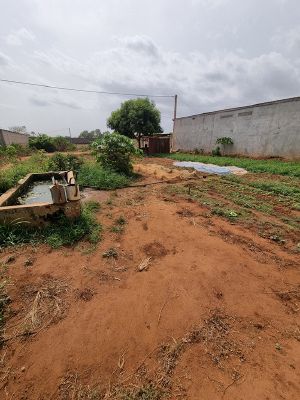
Water system
Source and equipment
- Underground drilling.
- Electric pump with water storage in a surface tank.
- Irrigation system:
Drip irrigation for tomatoes. Banded irrigation for other vegetable crops.
Irrigation frequency
- In the rainy season: 2 times a day, for 15 minutes per plot.
- In the dry season: 3 times a day, for 15 minutes per plot.
Social aspect
Satisfaction / dissatisfaction
- Workload: 8-9, very satisfied, he can hire a worker.
- Economic: 9, he can pay a worker and support his family.
- Work comfort: 9, love for his work, passion. He enjoys his work.
- Social: 8.
- Living environment: 8.
Scale from 1 = very dissatisfied, to 10 = very satisfied.
Environment
Technical Support / assistance
Support for training. The Dutch from Holland Green Tech come to train them on tomato production and the value chain to better enhance production.
Cooperation with other farmers
Romuald is part of two cooperatives:
- The cooperative of cassava producers in Akassato, where the president is a wise man who practices crop association extensively. He taught Romuald the maize-cassava-peanut association, which yields very good results without the use of any chemical inputs.
The cooperative of market gardeners in Akassato, where producers exchange ideas on production methods and especially pest control.
Economic aspect
Land
Romuald is not the owner of his land, it is provided to him free of charge (for now) so that he can produce on it. This allows him to occupy and enhance the land.
Equipment
- Hoe: 5000 FCFA.
- Machete: 5000 FCFA.
- Hoeing tool: 3000 FCFA.
- Electric sprayer: 40000 FCFA.
- Manual sprayer: 25000 FCFA.
- Rope: 2000 FCFA for 1 bag.
- Watering cans: 15000 FCFA for 2 watering cans.
- Irrigation system: 400,000 FCFA.
Donations, financial assistance
No donations or financial assistance apart from the provision of land.
Expenses
- Water, electricity:
- With drip irrigation system: 500,000 FCFA per year.
- With watering cans: 350,000 FCFA per year.
- Poultry manure: 150 bags per year = 200,000 FCFA.
- Seeds:
- Cobra F1 Tomato: 45,000 FCFA for 50 grams.
- Jarrah Tomato: 20,000 FCFA for 1000 seeds, currently under experimentation.
- Bell Pepper: 40,000 FCFA for 50 grams.
- Carrots: 15,000 FCFA for 50 grams.
- Cucumber: 55,000 FCFA for 1000 seeds.
- Lettuce: 25,000 FCFA for 5000 seeds.
Cost of production for main crops
- Tomatoes: 18,450,000 FCFA.
- Cucumbers: 120,000 FCFA.
- Lettuces: 150,000 FCFA.
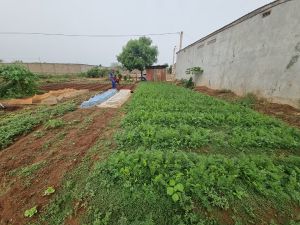
Income
- Tomatoes: 42,000,000 FCFA.
- Cucumbers: 1,500,000 FCFA.
- Lettuces: 300,000 FCFA.
- Papaya: The retail price range in CFA Francs for papayas is between 591.10 and 1,182.20 FCFA/kg in Porto-Novo and Cotonou. A papaya tree produces between 30 and 40 kg of fruits over 22 months[1].
Commercial strategy / markets
- Sale to "good ladies" intermediaries in the form of baskets, but it's not very profitable as he sells to them for about 300 FCFA/kg, compared to 1000 FCFA/kg at the supermarket.
- Sale to restaurants.
Currently, local producers cannot organize into cooperatives to sell together and increase their margin.
Farmer's advice
Everyone must eat, we will always manage to sell. He wants young people to come and settle with him to produce together according to the principles of agroecology to avoid impacts on human health primarily.
Today, it is hard to find work in the public sector, so you must venture into entrepreneurship. If you become a farmer, you become both the employer and the employee; plants are our children, and they must be cared for. If you venture into agriculture, you must commit 100%. Agriculture should be your main activity."
Photo gallery
Agroecological transition through experimentation
In the pursuit of a more sustainable and resilient agriculture, Romuald has embarked on an experimentation of agroecology with the members of the University of Abomey Calavi and the team from Ver de Terre Production. This innovative initiative, undertaken within the framework of the URBANE project, aims to transform traditional practices by adopting environmentally friendly methods while preserving and/or improving agricultural productivity. At the heart of this approach lies the integration of cover crops associated with tomato crop rotation, followed by planting tomatoes in the ridges formed by cutting the cover plants.
The main objective of this experimentation is to improve soil structure and its fertility in terms of chemical, physical, and biological properties. By promoting biodiversity and reducing soil tillage, Romuald hopes to reduce dependency on chemical inputs and irrigation. By associating legumes and cereals as cover crops for tomatoes, the experiment aims to enrich the soil with nitrogen and organic matter, two essential elements for soil fertility.
Trial matrix
The experimentation is based on three cropping modalities:
- Sorghum+Cowpea.
- Maize+Cowpea.
- Maize+Peanut.
Each modality includes a control without cover crops. These different cropping arrangements allow evaluating the effectiveness of various crop combinations in improving soil fertility. The setup is repeated over multiple cycles to measure the long-term evolution of results.
During the experimentation, several challenges were identified, especially regarding water and soil fertility management. Off-season cultivation, while beneficial for production, required more irrigation and labor. However, the improvement of soil structure through legumes and organic matter from the decomposition of cover plants offers promising prospects for reducing the medium-term needs for mineral fertilizers and irrigation.
Further experimentation and recommendations
To maximize the benefits of this experimentation, it's essential to optimize certain parameters such as irrigation, type, and management of organic matter. An adaptation of the trial matrix based on the specific conditions of the terrain will lead to more precise and replicable results.
Furthermore, it is recommended to continue research to refine agricultural practices and ensure a successful transition to a more sustainable and resilient agriculture.
Experimentation photos
Fertility trials
Establishment of experimentation: Planting and growth of cover crops
Experimentation monitoring: VESS test, MERCI method, and cover crop destruction
Experimentation monitoring: Tomatoes in the ridges
Ralstonia trial
Establishment of experimentation: Planting and growth of crotalaria cover crop
Experimentation monitoring: MERCI method and cover crop destruction
Experimentation monitoring: Tomatoes in the ridges
Sources
Interview with Romuald Gbegan conducted in February 2024 by the team of Ver de Terre Production as part of the Urbane project. Photo credits: Romuald Gbegan and Alexandre Cottin.
This page was written in partnership with the Urbane project and with the financial support of the European Union.
